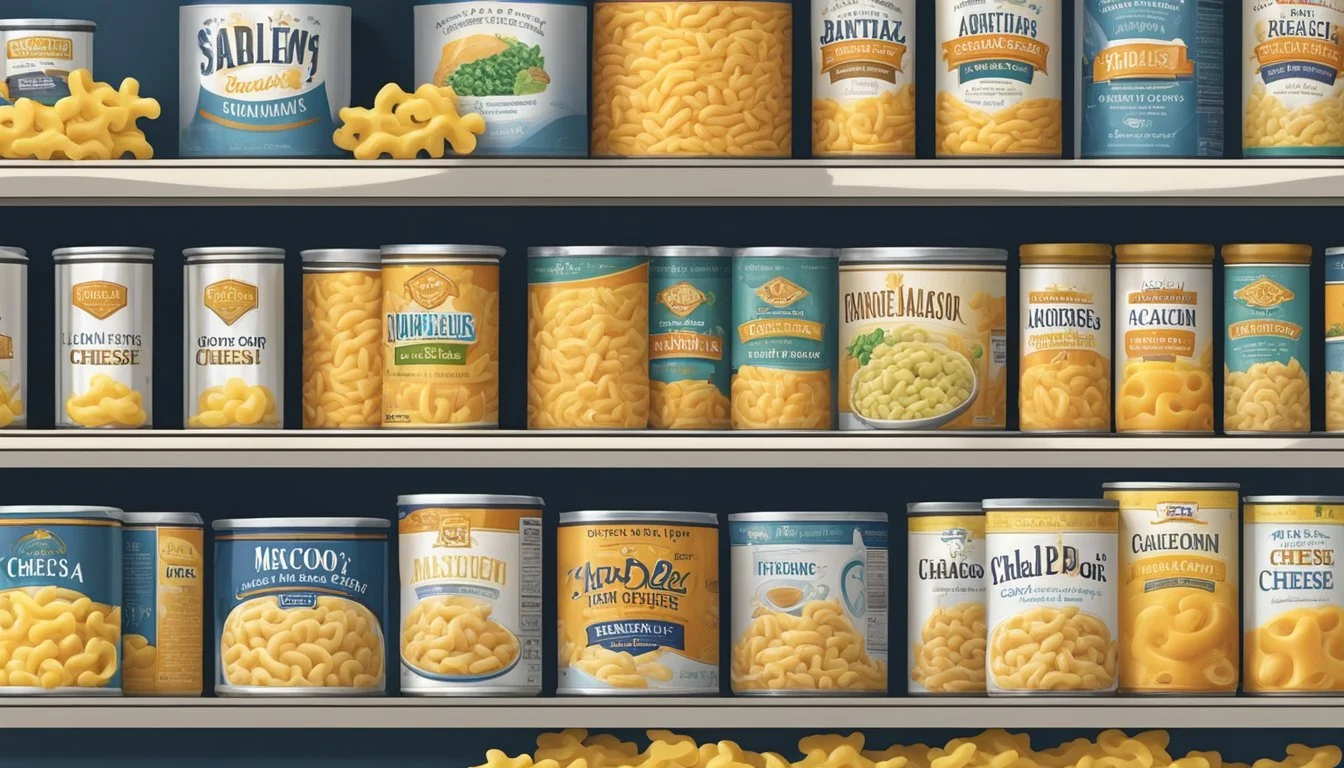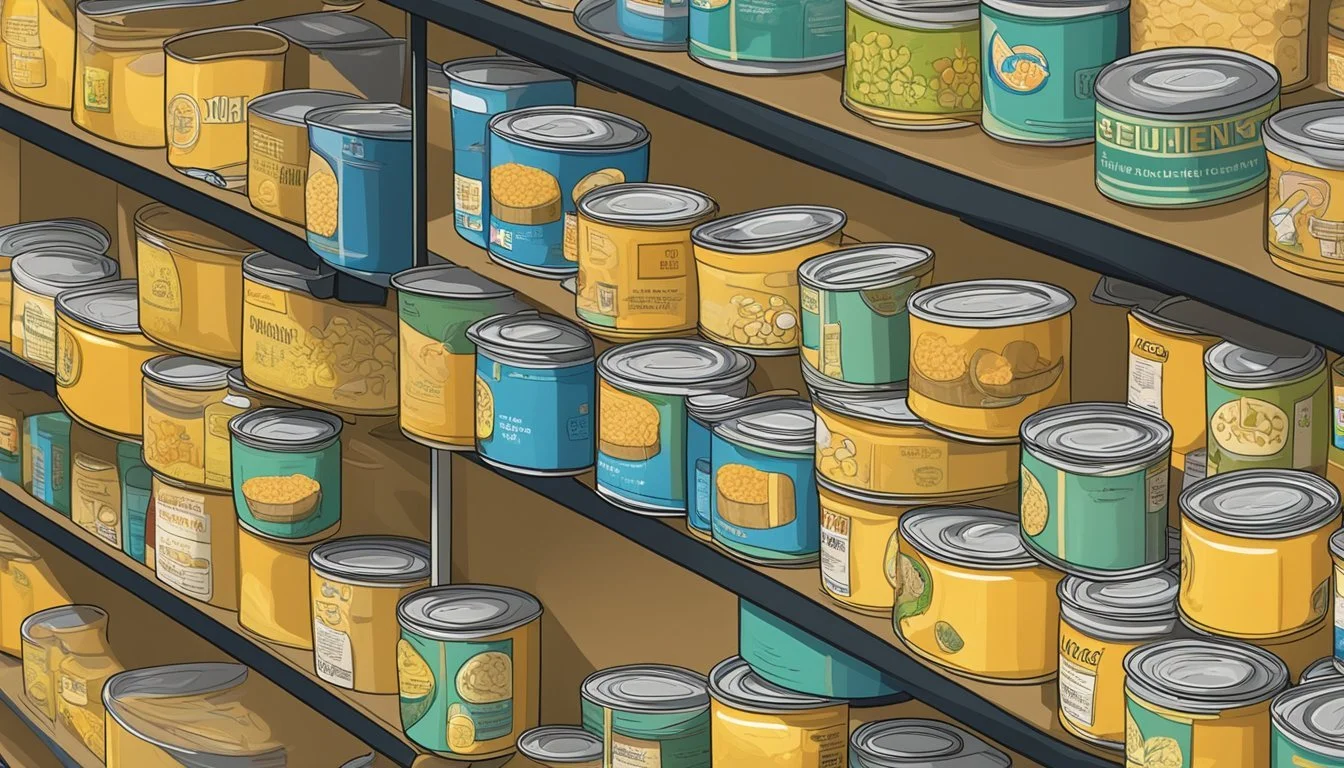Does Canned Macaroni and Cheese Expire?
Understanding Shelf Life and Safety
Canned macaroni and cheese, a pantry staple for many, often raises questions about its expiration and safety. Unopened canned macaroni and cheese can last well beyond its expiration date, retaining its quality for several months, or sometimes years, if stored in a cool, dry place. However, the expiration date on the can indicates the period the manufacturer guarantees peak quality, not necessarily safety.
Once opened, the shelf life of canned macaroni and cheese diminishes significantly. It should be transferred to an airtight container and refrigerated, where it will last for approximately 3 to 5 days. It's essential to inspect the product before consumption, as signs of spoilage like an off smell or visible mold mean it should be discarded.
Proper storage conditions play a critical role in extending the shelf life of canned macaroni and cheese beyond the printed expiration date. Exposure to extreme temperatures or moisture can impact its safety and quality. Checking for any bulging, rust, or dents in the can is also a good practice to ensure the product has not been compromised.
Understanding Expiration Dates
Expiration dates on canned macaroni and cheese help ensure food safety and quality. It's crucial to know the differences among expiration, best-by, and use-by dates when consuming canned foods.
Expiration, Best-By, and Use-By Dates
Expiration dates indicate the last day the manufacturer guarantees the product's safety and efficacy. Food should not be consumed past this date.
Best-by dates suggest when the product will be at its peak quality. The food might still be safe to eat after this date, but the flavor or texture could be compromised.
Use-by dates are provided for optimal quality and safety, especially for perishable items. Consuming food after the use-by date can pose health risks.
Interpreting Date Labels on Canned Foods
Sell-by dates are meant for retailers, indicating how long the product should be displayed for sale. It is not directly related to safety for consumers.
For canned macaroni and cheese, the shelf-life can extend beyond these dates if stored properly in a cool, dry place. Unopened cans can remain safe for years, while opened cans should be refrigerated and consumed within a few days.
Pay attention to packaging integrity. Rust, dents, and bulging are signs that the food may be compromised. Always inspect canned macaroni for any off odors or visual spoilage before consuming.
Proper Storage Conditions for Canned Macaroni and Cheese
Proper storage conditions for canned macaroni and cheese can help extend its shelf life and ensure the product remains safe to consume. Key factors include keeping the cans in a cool, dry place and maintaining the integrity of the package.
Storing Unopened Cans
Unopened cans of macaroni and cheese should be stored in a cool, dry place. Optimal storage conditions include temperatures ranging from 50°F to 70°F.
Avoid exposure to direct sunlight or high humidity areas, which can cause the cans to rust or compromise their structural integrity.
Pantry shelves are often the best option. Keeping cans away from appliances that generate heat, such as ovens and microwaves, is also advisable.
Best Practices for Opened Cans
Once a can of macaroni and cheese is opened, transfer any unused portion to an airtight container. This helps prevent the entry of bacteria and maintains moisture levels.
Store the container in a refrigerator at temperatures below 40°F. Consume the refrigerated leftovers within 3-5 days to ensure safety and quality.
Avoid storing opened cans directly in the fridge as the metal may impart off-flavors to the food and the can's integrity can degrade.
Effect of Temperature and Light
Temperature and light play significant roles in preserving the quality of canned macaroni and cheese. High temperatures can accelerate spoilage by promoting bacterial growth.
Store cans away from heat sources and extreme temperature fluctuations. Prolonged exposure to light can degrade the food quality inside the can, leading to nutrient loss and color changes.
For long-term storage, consider using a food storage closet or cabinet that minimizes exposure to both heat and light to maintain the product’s integrity.
Recognizing Signs of Spoilage
Recognizing when canned macaroni and cheese has spoiled is crucial for ensuring safety and maintaining quality. Several signs can indicate spoilage, including changes in appearance, smell, taste, and the condition of the can.
Visual and Texture Changes
Spoilage can often be detected through visual inspection and texture changes. Look for discoloration in the macaroni and cheese, which might appear as dark or off-color spots.
Mold growth is another clear indicator of spoilage and suggests bacteria may be present. The texture of spoiled macaroni and cheese may be different, such as a watery texture or unexpected lumps.
If the cheese appears rancid and separated, it's a warning sign that the product is no longer safe to consume.
Off Smells and Tastes
A reliable method to determine spoilage is by smelling and tasting the product, though tasting should be done with caution. The presence of a rancid cheese smell or a sour odor is a strong indicator that the macaroni and cheese has gone bad.
Flavor changes include a bad taste or an atypical sourness that suggests bacterial contamination. If the product smells or tastes off, it is best to discard it to avoid potential health risks.
Can Integrity and Preservation
Examining the integrity of the can is essential for assessing spoilage. Check for any signs of rust, bulging, or leaking, as these indicate the can's internal pressure and content have been compromised.
Rusted cans can lead to contamination. Bulging is a sign of gas production by bacteria within, which is a red flag for potential spoilage.
Leaking cans probably indicate that the seal has been broken and bacteria may have entered, making the contents unsafe to consume.
Health Risks Associated with Expired Products
Expired canned macaroni and cheese can pose several health risks. Primarily, the danger lies in food poisoning and other foodborne illnesses, due to the possible development of harmful bacteria and toxins.
Food Poisoning and Foodborne Illnesses
Consuming expired canned macaroni and cheese can lead to food poisoning. Harmful bacteria, such as Clostridium botulinum, can grow in improperly stored or expired canned goods, leading to botulism. Botulism is a severe form of food poisoning that causes muscle paralysis and can be life-threatening.
Dairy in macaroni and cheese can spoil, leading to the proliferation of pathogens like E. coli and Listeria. These bacteria can cause severe gastrointestinal distress, including diarrhea, vomiting, and stomach cramps.
Checking for signs of spoilage, such as swelling, rusting, or leaks in the can, is crucial. It's important to discard any cans that show these signs, even if the expiration date has not yet passed.
When to Seek Medical Attention
Seek medical attention if you experience symptoms of severe food poisoning after consuming expired products. Symptoms to watch for include prolonged vomiting, severe abdominal pain, difficulty breathing, or muscle weakness. These could indicate serious conditions like botulism or other foodborne illnesses that require prompt treatment.
If there are any signs of dehydration due to vomiting or diarrhea, such as dry mouth, dizziness, or reduced urination, rehydration and medical consultation are necessary. It's better to err on the side of caution when dealing with potentially dangerous foodborne illnesses.
Maximizing the Shelf Life of Macaroni and Cheese
The longevity of macaroni and cheese depends significantly on storage methods and the presence of preservatives. Effective techniques can ensure flavor, freshness, and nutrition are maintained for as long as possible.
Effect of Preservatives on Canned Goods
Preservatives play a crucial role in extending the shelf life of canned macaroni and cheese. These substances, such as sodium benzoate or citric acid, inhibit microbial growth and delay spoilage. Packaging is also key; cans are sealed to create an airtight environment, protecting the contents from external contaminants.
Proper storage conditions further enhance the effectiveness of preservatives. Keeping the cans in a cool, dry place helps maintain their quality. Always check for signs of damage such as dents or leaks, which can compromise the integrity of the product.
Freezing as an Option to Prolong Freshness
Freezing can significantly extend the shelf life of both cooked and uncooked macaroni and cheese. For leftover macaroni and cheese, place it in shallow airtight containers before freezing. This method helps preserve its moisture and texture.
Freezing uncooked macaroni and cheese in its original packaging is also an option. This approach keeps it fresh for several months. For best results, thaw frozen macaroni in the refrigerator before reheating. This method ensures even heating and minimizes changes in texture or flavor.
It's important to note that while freezing can prolong freshness, the quality might gradually decline over time. Always label frozen items with the date to keep track of their storage duration.
Preparing and Consuming Leftovers
Proper handling of leftover macaroni and cheese is crucial for maintaining its quality and safety. Following the right steps for storage and reheating can ensure that this beloved dish remains delicious.
Guidelines for Refrigerating Cooked Macaroni and Cheese
When storing cooked macaroni and cheese, first allow it to cool to room temperature. Place the leftovers in an airtight container to prevent moisture loss and contamination. Store the container on a refrigerator shelf, keeping the temperature at or below 40°F.
Use the leftover macaroni and cheese within 3-5 days. Labeling the container with the storage date helps track its freshness. Avoid leaving it at room temperature for more than two hours to prevent bacterial growth.
Tips for Reheating Safely
For safe reheating, it's important to ensure the macaroni and cheese reaches an internal temperature of at least 165°F. Use a food thermometer to check.
When using a microwave, stir the dish midway through to promote even heating. Cover the macaroni and cheese with a microwave-safe lid or wrap to retain moisture. For stovetop reheating, add a splash of milk and heat on low, stirring frequently.
Avoid reheating more than once to minimize the risk of foodborne illness. If reheated properly, the macaroni and cheese will maintain a satisfying texture and flavor.
Conclusion
Canned macaroni and cheese, a popular comfort food, can last a long time when stored properly.
Unopened, canned goods generally have a long shelf life due to their preservation methods. The USDA states that canned foods can often be safe past their expiration dates if there are no signs of spoilage.
Deterioration usually occurs slowly. The dried pasta inside the can is less likely to deteriorate quickly compared to other foods.
Acidic foods, such as canned vegetables and fruit, might not last as long as less acidic foods like pasta or cheese sauce mix.
Signs of spoilage include abnormal smells or discoloration. A rancid odor indicates that the product is no longer safe to eat.
Although stored properly, the quality of the product could diminish over time. Kraft products, known for their quality, might maintain their original quality longer than generic brands.
To ensure the best quality, it is recommended to consume the canned macaroni and cheese before the expiration date.
If concerned about safety, check the condition of both the can and the contents. If the can is dented, rusted, or bulging, it is best to discard it.
Using this guide can help maximize the shelf life of canned macaroni and cheese and enjoy it as a comforting meal.








